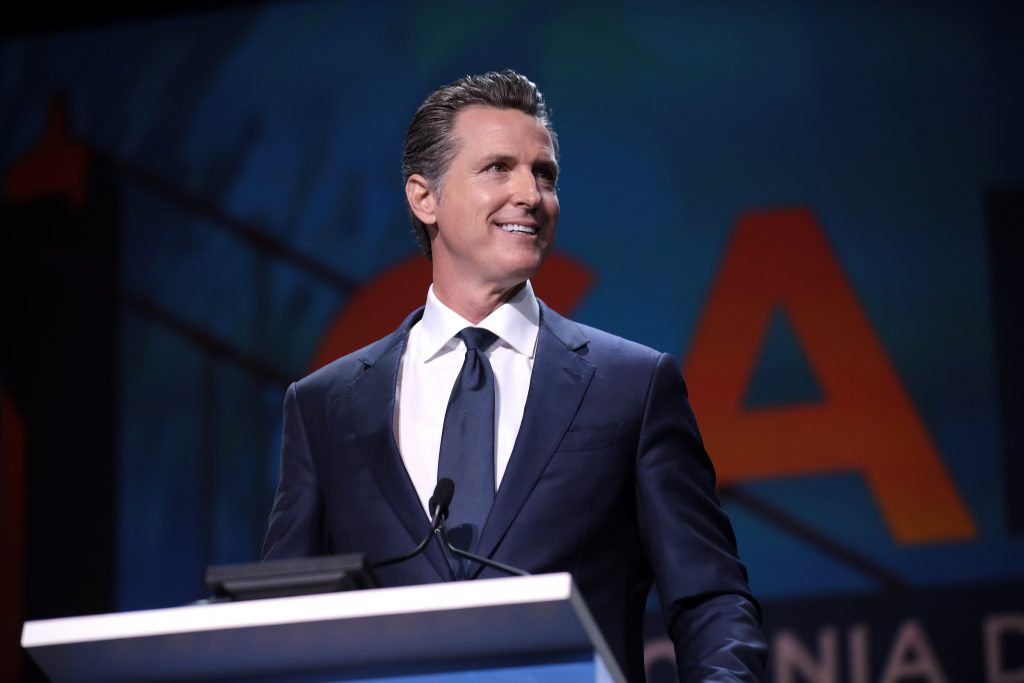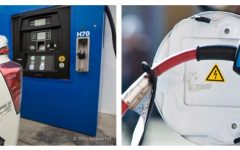
California Air Resources Board. (Photo: CARB)
CARB & Truck Makers Announce Agreement On Zero Emissions Vehicles
Still not worked out: battery recharging times in the future, huge shipping delays
By Evan Symon, July 6, 2023 1:16 pm
The California Air Resources Board (CARB) and a large coalition of truck makers, the Truck and Engine Manufacturers Association (EMA), announced on Thursday that they have reached an agreement on meeting the state’s plan to have only new zero-emissions trucks sold in California beginning in 2036.
Earlier this year in April, CARB announced that the sale of all new diesel big rig trucks and buses will be banned in the state of California starting in 2036, similar to the state’s new gas-powered car sale ban that is currently set for 2035. In addition to the 2036 sales ban on new diesel trucks and buses, CARB also announced that all trucks in California must be zero-emissions by 2042. Under these new regulations, also known as the Advanced Clean Fleets rule, CARB aimed to achieve a total zero-emissions truck and bus fleet by 2045, as well as have at least 1.6 million zero-emission medium- and heavy-duty trucks operating in the state by 2048.
However, CARB had passed these without the support of truck makers, leaving open questions on how effectively the new regulations could be implemented. CARB also failed to address negative effects of this policy, such as a possible shortage of trucks in California in the coming decades.
On Thursday, many concerns were put to rest following the new agreement between California and truck makers. The new agreement, known as the Clean Truck Partnership, is formally between CARB and truck makers including Cummins, Daimler, Ford, GM, Hino Motors, Navistar, Stellantis, and Volvo, along with several others in the EMA. In addition to the agreement on meeting California’s new zero-emissions law by 2036 in California, CARB will commit to meeting less-stringent new EPA regulations on nitrous oxide emissions and give a buffer of four years of lead time and three years of regulatory stability while transitioning into the new CARB emission laws.

In a statement on Thursday, CARB Chairwoman Liane Randolph said, “This agreement makes it clear that we have shared goals to tackle pollution and climate change and to ensure the success of the truck owners and operators who provide critical services to California’s economy.”
Governor Gavin Newsom said in a different statement, “California has shown the world what real climate action looks like, and we’re raising the bar yet again. Today, truck manufacturers join our urgent efforts to slash air pollution, showing the rest of the country that we can both cut dangerous pollution and build the economy of the future.”
Truck manufacturers, who initially opposed the new laws, appeared to be more willing to accept the new agreement on Thursday, due, in part, to CARB giving some allowances on nitrous oxide emissions in exchange for agreeing to the 2036 date on zero emissions vehicles being sold.
Agreement on the 2036 regulations
“This agreement reaffirms EMA’s and its members’ longstanding commitment to reducing emissions and to a zero-emissions commercial vehicle future and it demonstrates how EMA and CARB can work together to achieve shared clean air goals,” added EMA President Jed Mandel. “Through this agreement, we have aligned on a single nationwide nitrogen oxide emissions standard, secured needed lead time and stability for manufacturers, and agreed on regulatory changes that will ensure continued availability of commercial vehicles. We look forward to continuing to work constructively with CARB on future regulatory and infrastructure efforts designed to support a successful transition to ZEVs.”
Despite the new agreement, trucking groups and advocates continued to oppose the new CARB regulations, noting that there are still several issues to be worked out, such as concerns over what it will mean for battery recharging times in the future, huge shipping delays due to the changeover, and other problems that fleet electrisation has already shown in Europe and China.
“It’s good that CARB threw a few bones here for truck manufacturers, but this is all assuming that we will be in a much better place technology-wise in 2035 and 2036,” said Simon Bernard, a trucking advocate who works with many trucking and shipping companies on logistics and fleet issues, to the Globe on Thursday. “We need way better recharging times and more extensive testing to see if trucks can, long-term, still move forward with the same wear and tear that their gas and diesel counterparts are at.”
“What we don’t want are delays due to charging and other issues, as that could lead to shipping delays. California has many important ports and trucking hubs and is critical for the supply chain in the U.S. Hopefully, if we haven’t reached the level needed by then, there will be added extensions. The auto industry saw extensions for a lot of now standard features, like back up cameras and unleaded gasoline. California and CARB need to be flexible too and make 2036 a more flexible date just in case we need more time to figure out the charging situation in the future.”
More on the new agreement is expected soon.
- Port Of Oakland Appeals Temporary Court Ruling Blocking use of ‘San Francisco Bay’ In Name - December 13, 2024
- Farmers Insurance to Increase Number Of Homeowner & Renter Policies in California - December 12, 2024
- Gov. Newsom Announces April 29, 2025 Special Election Date for Two State Elections - December 12, 2024





Why are 14 unelected bureaucrats on the California Air Resources Board (CARB) allowed to make draconian dictates that negatively impact 39 million Californians? Why would a coalition of truck makers agree with the demands of these unelected CARB bureaucrats? Maybe they are all getting financial incentives, bribes, kickbacks and even threats to impose the agenda of the WEF and NWO globalist cabal to control the masses?
Here’s the14 unelected CARB bureaucrats: Liane M. Randolph; John Eisenhut; Susan A. Shaheen; John R. Balmes; Diane Takvorian; Bill Quirk; Dean Florez; Hector De La Torre; Davina Hurt; V. Manuel Perez; Eric Guerra; Nora Vargas; Dr. Tania Pacheco-Werner; Gideon Kracov; Henry Stern; Eduardo Garcia; Hon. Steven S. Cliff; Edie Chang; Chanell Fletcher; Annette Hebert; Edna Murphy; Rajinder Sahota; Sydney Vergis; and Ellen M. Peter.